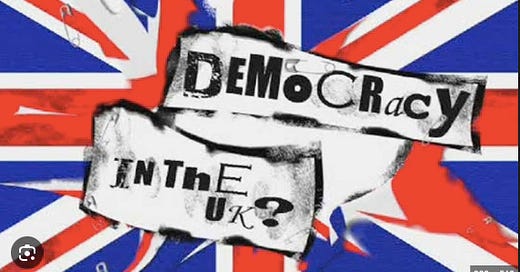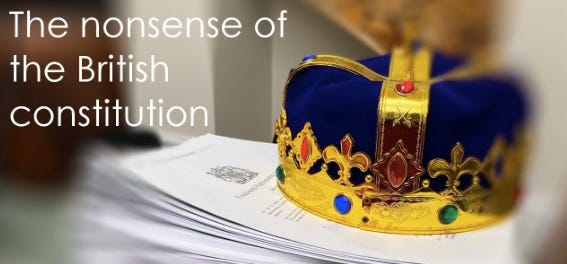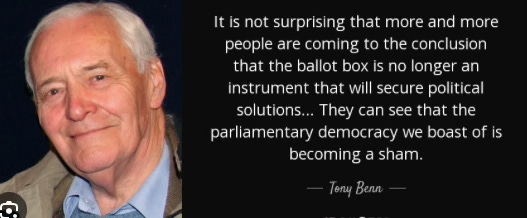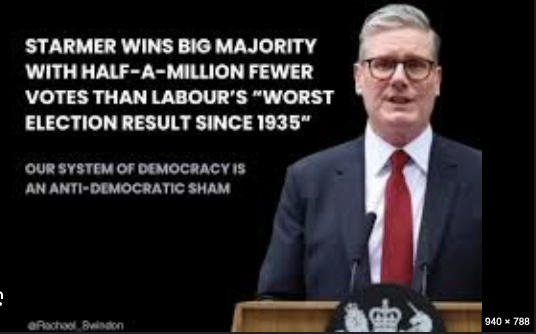Alex Krainer recently published a piece about the dying of American democracy. He argues that the American political system increasingly resembles that of its former colonizer. Both the US and UK claim to be representative democracies when the reality is that they’re controlled by a global corporate oligarchy, which explains why the wishes and welfare of the people are habitually ignored.
Krainer refers to a 1964 book by American historian Carrol Quigley, Tragedy and Hope: A History of the World in Our Time, that drew back the curtain on American ‘democracy’, revealing the extent to which an unelected elite runs the show. When the Establishment realised how explosive Quigley’s thesis was, they pulled the book from sale and destroyed unsold copies, including the printing-plates.
Quigley had much to say about the UK political system. Note that in places he refers to “England and English,” acknowledging the origins of the UK governance model.
▪️ “…the greatest difference between Britain and the US rests in the fact that the former has no constitution. This is not generally recognized (p. 461)”
▪️ “… many of the relationships which are covered by conventions are based on precedents that are secret (such as relationships between monarchy and Cabinet, between Cabinet and political parties, between Cabinet and civil service, and all the relationships within the Cabinet) and in many cases, the secrecy of these precedents is protected by law under the Official Secrets Act… (462)”
▪️ “It is seriously stated in many books that the Cabinet is responsible to the House of Commons, and controlled by it. In truth, the Cabinet is not controlled by the Commons but the reverse." (463)
▪️ The fact that there are no primary elections in Britain and that party candidates are named by the inner clique of the party is of tremendous importance and is the key to the control which the inner clique exercises over the House of Commons, yet it is rarely mentioned in books on the English political system." (463)
▪️ “There is also no separation of powers. The Cabinet is the government and ‘is expected to govern not only within the law, but, if necessary, without law or even against the law’. There is no limit on retroactive legislation, and no Cabinet or Parliament can bind its successors. The Cabinet can enter into war without Parliament’s permission or approval. It can expend money without Parliament’s approval or knowledge… It can authorize violations of the law, as was done in regard to payments of the Bank of England in 1847, in 1857, or in 1931. It can make treaties or other binding international agreements without the consent or knowledge of Parliament…" (469)
▪️ "The idea, widely held in the US, that the Commons is a legislative body and the Cabinet is an executive body is not true. Legislation originates in the meetings of the inner clique of the party, acting as a first chamber. If accepted by the Cabinet it passes the Commons almost automatically. The Commons, rather than a legislative body, is the public forum in which the party announces the decisions it has made in secret party and Cabinet meetings and allows the opposition to criticize in order to test public reactions. Thus all bills come from the Cabinet, and rejection in Commons is almost unthinkable…" (469)
▪️ “there have been many restrictions on democracy in Britain… effectively curtailing the exercises of democracy in the political sphere. (470)”
▪️ “Since the two chief parties in England do not represent the ordinary Englishman, but instead represent the entrenched economic interests directly, there is relatively little ‘lobbying,’ or attempting to influence legislators by political or economic pressure. (477)”
Not much has changed.
The UK still has no written constitution.
Parliamentary democracy is a sham.
Political parties choose compliant candidates and silence dissidents.
Politicians answer to their donors, not the people.
The Establishment controls the media.
The police are used to crush dissent.
The voting system thwarts the people’s will - the current government controls 63% of parliamentary seats on 33.7% of the vote.
Ten years ago, Scotland had a chance to break away from this faux union. Maybe a majority of Scots did vote to leave and the votes were rigged by a panicked British establishment - we may never know. But we do know that same establishment has effectively neutered the SNP.
So, what now? No former British colony won their independence by politely asking the coloniser - the people took it. Scotland is no different. And we’re in a strong position because Westminster has recognised that the Scottish People are sovereign. Isn’t it time we flex our sovereignty and take back our nation?













More to the point, representationalism is not democracy, which is "government of the people, by the people and for the people", more specifically, government in which policy is formulated by optional minimal/optimal individual responses to local, regional, and national referenda (ie citizen-initiated referenda (CIR).
a lot of what you say here is also suggested in Rory Stewart's book, Politics On the Edge. So disheartening and disturbing.